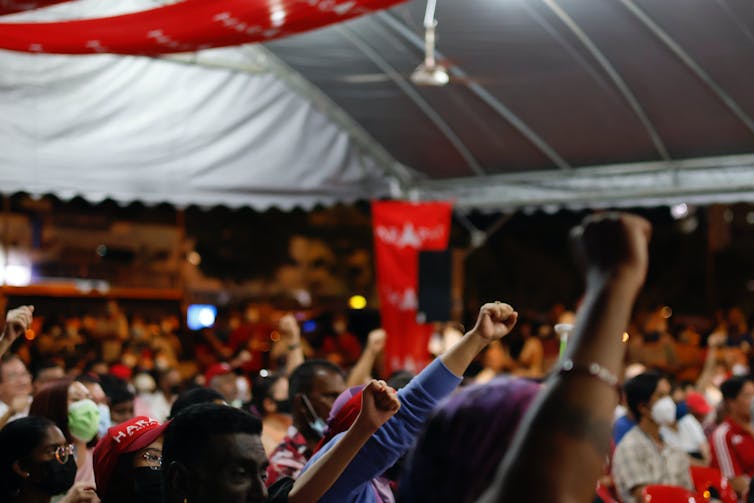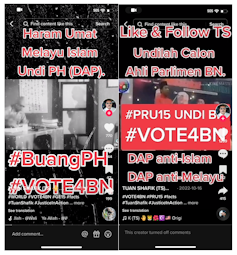How TikTok became a breeding ground for hate speech in the latest Malaysia general election
Hate speech on social media is a major problem in many regions of the world, including Southeast Asia.
Hate speech includes speech intended to discriminate against, insult, degrade, or provoke violence against any individual or group based on race, ethnicity, religion, gender, sexual orientation, national origin, or others.
In Southeast Asia, TikTok has become a breeding ground for hate speech. Multiple studies have shown that TikTok has been used to spread racist, sexist, and homophobic language.
TikTok has policies against hate speech and disinformation, but such content persists, exacerbating the problem of hate speech in the region.
My latest research, due to be published as a book chapter in January 2024 by the Ateneo Policy Center, Ateneo University, Philippines, and focusing on the 15th general election in Malaysia last year, reflects this pattern.
The election in Malaysia
Malaysia has a diverse population of different ethnicities and religions, which at times creates tension and conflict.
Throughout history, Malaysian elections have often been marred by hate speech and propaganda.

She Le/UnsplashCC BY
Hate speech can pose a serious threat to national harmony and security. Not only can it polarize voters, it can also incite violence.
With the rise of technology and the popularity of social media, the spread of hate speech and propaganda in Malaysia is becoming more widespread, making it an urgent issue that requires attention.
TikTok is popular with young Malaysians. And for the first time in Malaysia’s history, the government is allowing 18-year-olds to vote. Previously, the minimum voting age was 21.
I used specific keywords that included the acronyms for the 15th general election in both Malay and English.
These included “PRU 15” (Pilihanraya 15, meaning 15th general election in Malay) and “GE15” (15th general election), as well as the names of major political coalitions such as “Perikatan Nasional” and “Pakatan Harapan”.
I’ve also included acronyms for major political parties such as “DAP” (Chinese-Majority Democratic Action Party), “PAS” (Malaysian Islamic Party), “BN” (Barisan Nasional), and “GPS” (Sarawak Alliance Party).
In addition, I add the names of selected political leaders such as “Anwar Ibrahim” (Leader of Keadilan Political Party), “Muhyiddin” (Former Minister Muhyiddin Yassin), “Lim Guan Eng” (Chairman of DAP) and “Abdul Hadi”” ( Abdul Hadi Awang, President of the PAS).
To track content uploaded to TikTok approximately two weeks before and after the November 19, 2022 election, I identified 2,789 videos on the platform using specific keywords that were posted between November 1 and December 15, 2022.
I analyzed 679 videos with over 1,000 views and found 373 with hateful narratives and propaganda.
Findings revealed Malay-language hate speech targeting non-Malaysians, particularly the Chinese community, and Chinese-language content that focused on Malaysians and Islam in Malaysia.
For example, on November 11, 2022, a TikTok user (@125cc_madi) posted a video with over 16,000 views showing DAP supporters criticizing the Muslim PAS as “stupid Muslim ulama”.
Another TikTok user, @muhdasyari6, claimed in a video that the predominantly Chinese DAP is a racist political party that wants to eliminate special rights for Malays. It should be noted that the DAP is not a racist political party. Although the videos have been removed, controversial content related to ethnicity and religion can still be found on TikTok.

Nurrianti Jalli
A notable example is a video posted on November 7, 2022 by a user named Tuan Shafik (@tengkushafik1).
It shows the text Haram Umat Melayu Islam undi PH (Pakatan Harapan)meaning Malaysian Muslims are banned from voting for Pakatan Harapan as the Chinese-majority DAP is portrayed in the coalition as anti-Malay and anti-Islamic.
Another example: On November 8th, 2022 @Hussen_Zulkarai posted a video below accusing DAP of being sympathetic to Communism even though they are not affiliated with it. Although this video is in the default Malay language, it is still publicly viewable on TikTok.
These videos stayed on TikTok until March 15, 2023.
This has raised questions about the effectiveness of TikTok content moderation for hate speech in non-English speaking countries like Malaysia.
New trending hashtags related to the May 13 incident
During my exploratory research, I found that the hashtags #13mei and #13Mei1969 were flooding TikTok amid the recent election.
These hashtags are related to the May 13 Incident, a 1969 conflict between Malay and Chinese communities in Kuala Lumpur sparked by a protest rally against the election results. This conflict resulted in violence, casualties and property damage.
The #13mei videos on TikTok sparked outrage among Malaysians in the recent election, accusing political actors of using the incident to stoke anti-China sentiment.
On TikTok, neo-nationalists and suspected cyber-soldiers linked to the ruling Perikatan Nasional government have posted videos suggesting a possible repeat of the 1969 “race war” tragedy if the Chinese-majority Democratic Action Party and its Coalition, Pakatan Harapan, come to power Malaysia.
As Malaysia faced its first-ever hanging parliament and no major parties secured enough votes to form a new government, concerns were raised that a Pakatan Harapan victory could potentially spark a backlash against the Chinese community.
How did TikTok react?
Malaysian authorities contacted TikTok to crack down on hate speech and disinformation, particularly due to the spread of #13Mei content.
Although TikTok’s automated system blocked thousands of videos, it was deemed insufficient as hateful content persisted on the platform months after the election. Reports of TikTok allowing paid partnerships for political content during the Malaysian election also raised concerns.
While TikTok has policies to combat hate speech, disinformation, and misinformation, insufficient enforcement of these policies could result in significant real-world impacts.
These include heightened tensions and misunderstandings between different groups that could potentially affect the outcome of elections.
